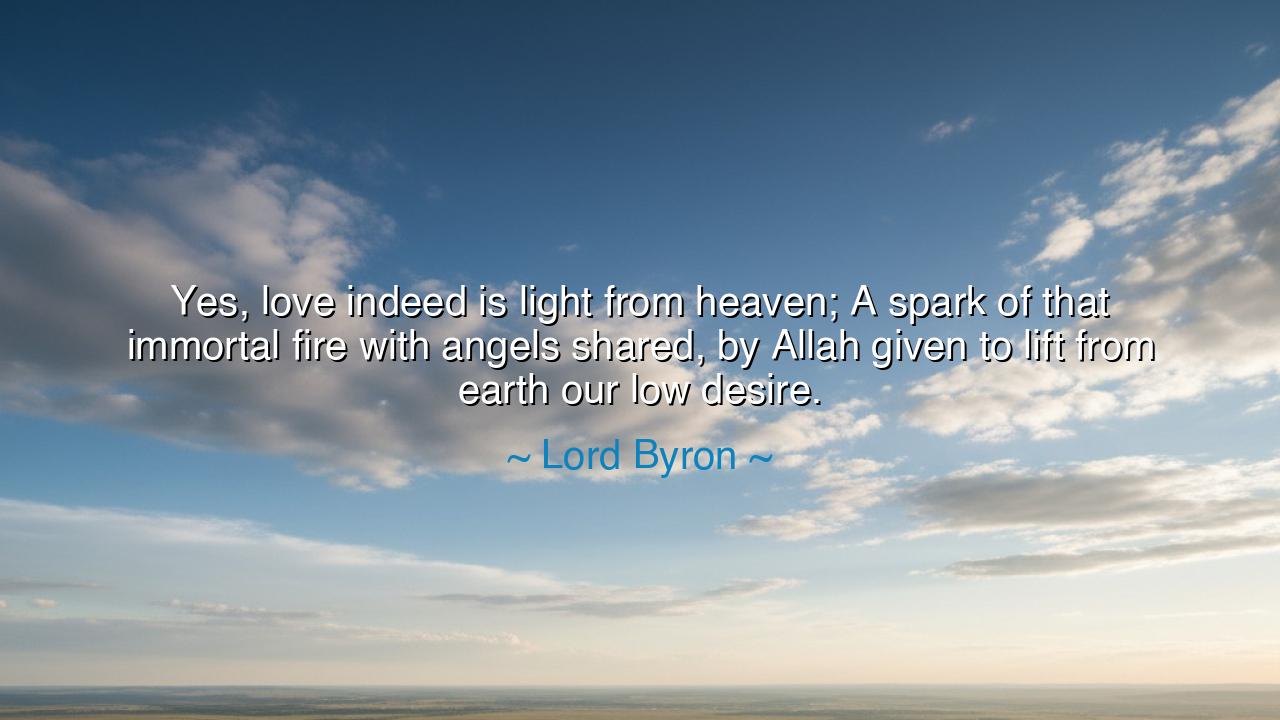
Yes, love indeed is light from heaven; A spark of that immortal
Yes, love indeed is light from heaven; A spark of that immortal fire with angels shared, by Allah given to lift from earth our low desire.






“Yes, love indeed is light from heaven; a spark of that immortal fire with angels shared, by Allah given to lift from earth our low desire,” wrote Lord Byron, the poet whose soul burned like the very flame he describes. In this verse, Byron speaks not merely of human affection, but of divine love — that sacred energy descending from the heavens to purify the heart and raise it above its baser cravings. To Byron, love was not just passion or pleasure; it was a celestial force, a gift from God, sent to remind humanity of its divine origin. In his words, we glimpse a bridge between heaven and earth, a spiritual ladder upon which the human soul ascends through tenderness, sacrifice, and longing toward what is eternal.
The origin of this quote lies in Byron’s poem The Giaour (1813), one of his great works inspired by the East and steeped in mystic imagery. In it, Byron meditates on love, faith, death, and redemption — themes that defined not only his poetry but his life. The poet, though born into an age of reason and rebellion, was haunted by the idea that love is the last remnant of paradise still alive in the human heart. He invokes Allah not merely as an exotic name but as a symbol of the One Divine Source — the same truth acknowledged in every faith, that love is a heavenly fire kindled in the soul to draw man closer to his Maker. Through this verse, Byron blends the sensual with the spiritual, showing that love, though it begins in the body, belongs ultimately to the realm of spirit.
“Light from heaven” — so he calls it. And truly, love is illumination. It pierces the darkness of selfishness and ignorance, showing us the divine beauty that dwells within another soul. When we love purely, without possession or pride, we catch a glimpse of what angels know — that love is the essence of the divine itself. To love another deeply and selflessly is to see them as heaven sees them: not as a body or a name, but as a living fragment of eternity. Thus, Byron’s “immortal fire” is not the fever of passion that fades with time, but the eternal flame of compassion and reverence that lifts humanity above its animal nature. It is this spark — divine, uncreated, unending — that transforms the heart into a temple of light.
History offers us radiant examples of this truth. Think of Rābiʿa al-ʿAdawiyya, the great Sufi mystic of the 8th century, who declared, “I love God not for fear of hell, nor for desire of heaven, but because He is worthy of love.” She was once a slave, but her soul burned with that same immortal fire Byron described. She spent her life in prayer and song, her love for the divine so pure that it dissolved all lesser wants. Her love lifted her from “earth’s low desire” — from attachment, vanity, and fear — and carried her into a union beyond words. Like Byron’s verse, her life teaches that the highest form of love does not enslave; it liberates. It is not the chain of passion, but the wings of the spirit.
Byron himself, though often seen as a man of indulgence and scandal, yearned deeply for this higher love. His restless life — filled with voyages, forbidden affairs, and defiance of convention — was also a pilgrimage toward meaning. Beneath his passion burned a hunger for purity, for transcendence. In calling love a “gift from Allah”, he acknowledges that the divine chooses even the flawed to bear its fire. Love, for Byron, is not the privilege of saints; it is the redemption of sinners. It is the force that teaches humility, that awakens compassion, that lifts even the fallen heart toward the stars.
To say that love “lifts from earth our low desire” is to say that love is both crucible and cure. It burns away lust, pride, and greed — all the heavy chains that bind the soul — and leaves only what is luminous. True love teaches sacrifice; it reveals that to give joy to another is to find joy oneself. It cleanses the heart until what remains is not hunger, but harmony. Thus, love is not an escape from the world, but its transformation. Through love, even suffering becomes sacred, and the common becomes divine.
So, dear listener, what lesson can we draw from Byron’s heavenly fire? It is this: seek love not as possession, but as purification. Let your love be light, not smoke; a blessing, not a burden. When you love, let it lift you — not into passion’s storm, but into compassion’s stillness. See in every act of kindness, every forgiveness, every tender word, a spark of the divine descending into human life. Guard that spark, for it is the same fire that burns in angels, the same light that shines in all who have ever truly loved.
For Byron spoke the truth of all ages: love is light from heaven, and though it burns in mortal hearts, its flame is eternal. Cherish it. Let it refine you. For in that sacred fire lies the path by which the human rises toward the divine — the immortal flame that will one day lead the soul home to its source.






AAdministratorAdministrator
Welcome, honored guests. Please leave a comment, we will respond soon